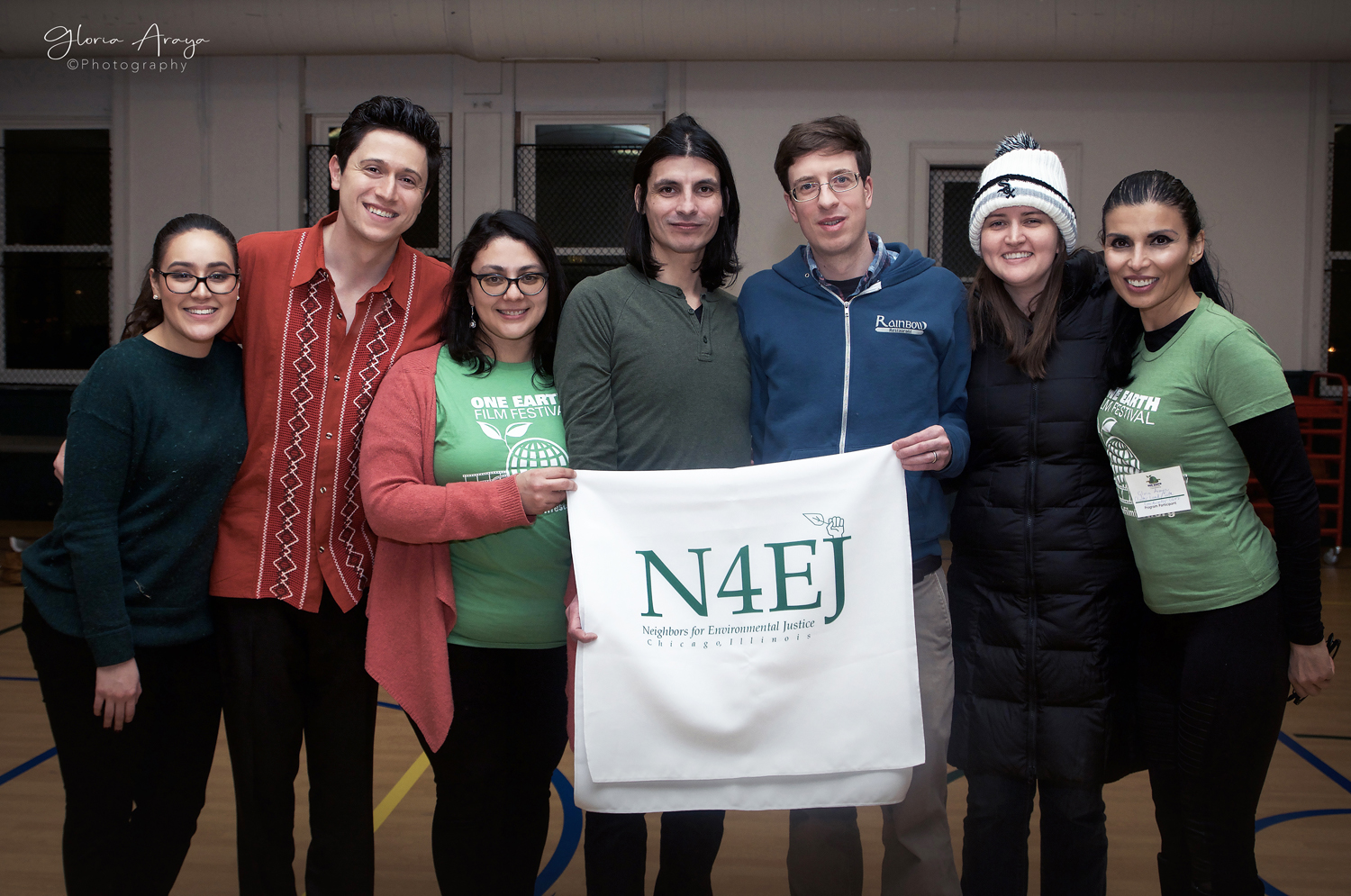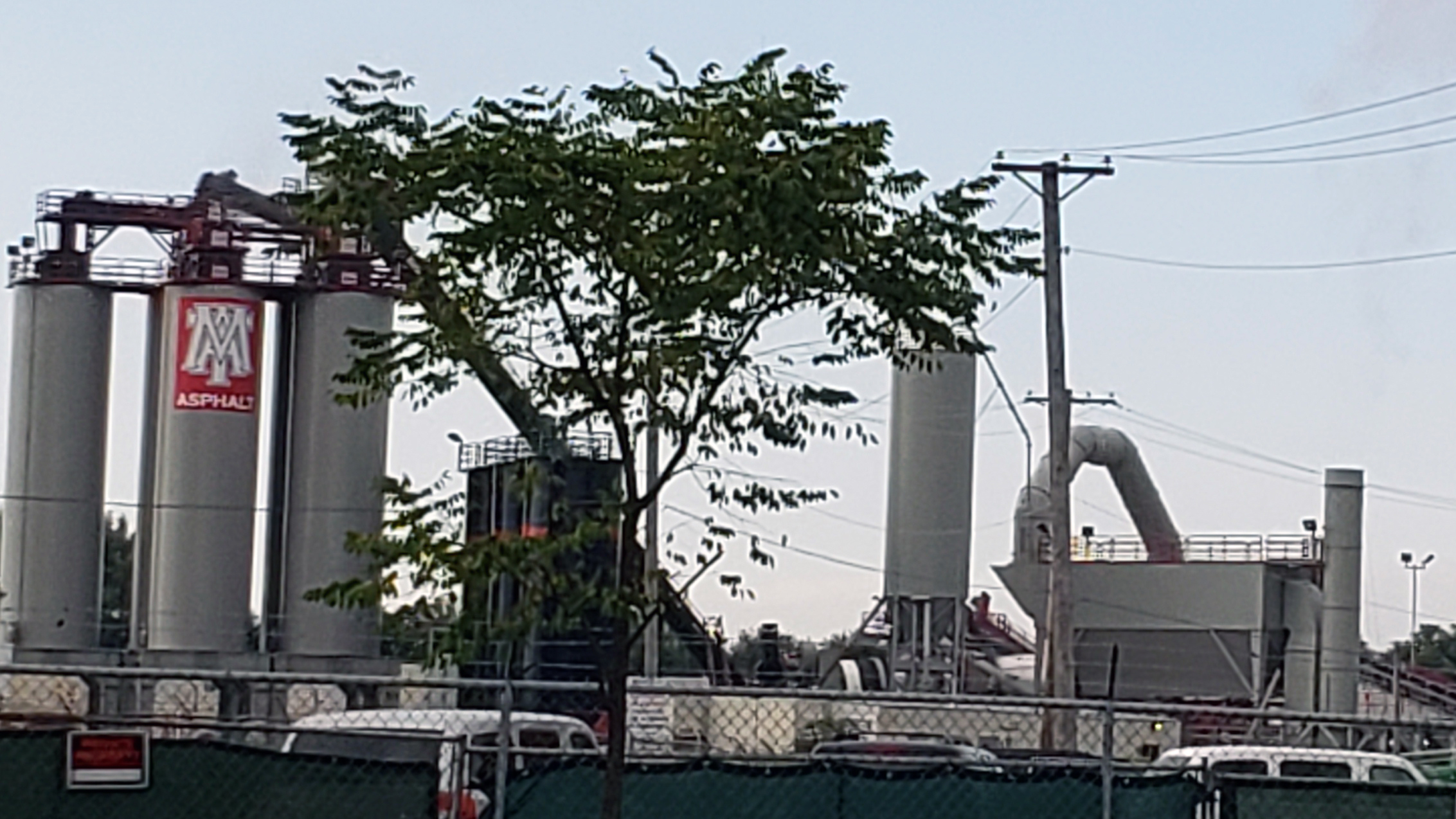From left, Samantha Alvarez, Vince Gomez, Myrna Romo, Alfredo Romo, Robert Beedle, Carol Beedle, and Gloria Araya. Myrna, Alfredo and Robert hold the sign for Neighbors for Environmental Justice (N4EJ).
By LIsa Biehle Files
One Earth Film Festival learned this tale of environmental woe while screening the film “Inventing Tomorrow” at Namaste Charter School, located in McKinley Park, about half a mile from MAT Asphalt.
It happened suddenly, almost overnight. Just 700 feet from young children playing, MAT Asphalt, LLC appeared on the southern border of McKinley Park, at 2055 W. Pershing Rd., in Chicago, in early 2018. The plant produces up to 890,000 tons of asphalt per year.
According to its website, MAT combines limestone aggregate, recycled asphalt pavement and recycled roofing shingles with a petroleum-based liquid cement as binder in order to make asphalt. This process could potentially release particles and toxins into the adjacent, residential Chicago neighborhood.
Almost as quickly, Neighbors for Environmental Justice (N4EJ) formed in response; they are a group of local citizens who claim the plant brings dust and fumes, which could damage children’s lungs, increase rates of asthma, and possibly worse.
Robert Beedle, one of N4EJ’s founding members and an ad hoc spokesman for the group, lives just half a mile from the plant, where he recently began smelling petroleum and asphalt.
In his opinion, “The underlying discrimination along racial and economic lines is obvious because of where and how this went down.”
According to the Census Bureau’s American Community Survey data, McKinley Park is 54 percent Hispanic, 21 percent Asian, 17 percent White and 7 percent Black. The median household income is about $42,000 per year.
Robert and his wife, Carol, decided to live in this working-class neighborhood because of the happy families they observed. “I want people to imagine that this happened next to Lincoln Park or the lakefront,” he said. “It’s just unacceptable. This community was not informed beforehand.”
Robert continued: “As a young white guy, maybe I am more capable of fighting back than someone who might be undocumented or someone who is too busy raising children.”
According to Robert, recycled roofing shingles are the most controversial ingredient in the asphalt mix produced by MAT because they may not always be screened for toxins such as asbestos or tar coal sealant.
MAT Asphalt, LLC as seen from McKinley Park. Photo courtesy of Neighbors for Environmental Justice.
Kimberly Wasserman Nieto, executive director of the Little Village Environmental Justice Organization (LVEJO), knows about this problem firsthand as a resident of McKinley Park herself. A native of Little Village, she helped shutter two dirty coal plants there after 12 years of protest.
At the first N4EJ meeting, Kimberly helped inspire McKinley Park residents to become activists on behalf of their community, a neighborhood she had moved to from Little Village in order to, ironically, have cleaner air and more recreational space for her children.
Recently, Kimberly expressed her thoughts about what she sees as repeated mistakes: "Our communities will no longer stand to be sacrificed because the city doesn't want to hold industry accountable. From Little Village to McKinley Park to the Calumet, we deserve the right to clean air, land and water regardless of our income, immigration status or race."
The state EPA claims that it informed local residents and politicians by mail in advance of the plant’s construction, but people uniformly say they never received any information. As a consequence, State Senator Antonio “Tony” Munoz drafted a bill legally requiring Illinois’ EPA to inform the relevant state senators and representatives by certified or registered mail when a permit application could impact air or water quality.
To be fair, MAT is permitted to operate by the IEPA and claims to have the most up-to-date equipment for their processes which “meets or exceeds EPA air quality standards.” In a Chicago Tribune article, owner Michael Tadin Jr. said, “There is no environmental concern.”*
Just to be certain, N4EJ set up seven independent air quality monitors in the McKinley Park and Back of the Yards neighborhoods. Results are available on purpleair.com, which shows that air quality in McKinley Park is generally worse than in most other parts of the city.
Up to 200 diesel trucks load and unload at the MAT facility per day. Increased diesel emissions could contribute to poor air quality as well as the release of fumes and dust when material is transferred to and from trucks. Residents say that a promise to cover transported material with tarps has not been consistently fulfilled.
Recently, MAT Asphalt submitted an application to the Illinois EPA for a five-year pollution permit. Meanwhile, N4EJ has requested a public hearing which may take place this summer. At that time, the company could release their emissions data, and most likely, N4EJ will do the same.
To boot, the N4EJ petition to close the plant has 1,300 signatures and continues to grow.
12th Ward Alderman George Cardenas supported construction of the asphalt plant in order to bring jobs and a tax base to the neighborhood. While Cardenas originally claimed hundreds of locals would gain employment, the company website lists nine full-time employees.
Ironically, Cardenas also chairs the Chicago City Council’s Committee on Health and Environmental Protection. The Chicago Tribune has researched a trail of campaign donations to the Cardenas campaign from family and friends of MAT’s owner, Michael Tadin Jr.*
Could these dealings, plus a zoning change in March of 2017, have ‘paved the way’ for MAT’s construction in McKinley Park?
The fumes from this controversy are as pungent as . . . hot asphalt.
To get involved or learn more, go here:
Twitter: @N4EJchicago
Facebook: fb.com/N4EJchicago
Sign up for N4EJ Newsletter: tinyletter.com/N4EJchicago
Websites: https://n4ej.org/ and bit.ly/asphaltplant
Air monitoring: @swsideair or www.purpleair.com/
*Worried about fumes, McKinley Park residents say officials failed to notify them about asphalt plant being built nearby, by Tony Briscoe, Chicago Tribune, June 29, 2018.
*McKinley Park group rallies neighbors to push back against asphalt plant, lack of notification, by Tony Briscoe, Chicago Tribune, July 29, 2018.


